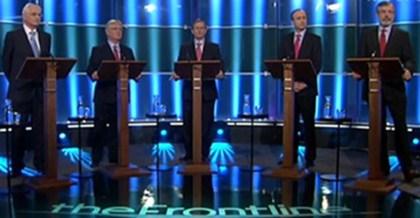Good night for Kenny, but Adams strongest of leaders

Over 950,000 people tuned in to last night's five-way leader's debate on RTE. Enda Kenny undoubtedly had the most to lose, particularly following his absence at last week's TV3 debate, so the Fine Gael camp will be relieved to see him emerge relatively unscathed. Colin Murphy offers his analysis of the event.
Gerry Adams won last night's debate by a country mile, showing a brilliant and consistent display of focused anger. It didn't matter (to those to whom that appeals) that he clearly neither knows nor cares where the money comes from. His evocation of republican citizenship was superb.
Green Party leader John Gormley may just have rescued his - or some other Greens - seat. If only he had left government in 2008. Intellectually his contributions were almost invariably stronger than other party leaders.
Enda Kenny came across much smarter than he is commonly portrayed. You can't take a line from your advisors so well, and also be thick. He doesn't (can't) improvise, but he was focused and efficient.
Eamon Gilmore was adequate, but eclipsed by Kenny to his right and Adams to his left. The Labour leader failed to land his "5 billion" punch on Kenny, despite the fact that the point seems to be sound. Kenny rebutted it adequately.
The most pointless contribution was from Micheál Martin because he was the one centrist there guaranteed not to be in government. There may be good ideas there, but they're irrelevant, except to give hope that Fianna Fáil might actually support proper reform from opposition. If we still throw the line "800 years" at the Brits, it will be a long time before a Fianna Fáil leader can rebut the line "14 years".
In terms of representation of the electorate, the debate was clearly flawed by the absence of the United Left Alliance, though given that they failed to get themselves registered as a party, they've only themselves to blame. But just as Gilmore had difficulty distinguishing himself adequately from Kenny, the ULA's presence would have blunted Adams's impact: he wouldn't have had the "conscientious objector" corner (irony noted) all to himself.
Overall, it was a big night for Kenny. He cannot now be caught. The only question is whether Gilmore is Tánaiste or leader of the opposition. The latter would raise the intriguing possibility of a Green rump returning to government, PDs-style, along with Independents.
What would have struck a Martian, though, was the extraordinary similarity between the speakers, with the exception of Adams. Everybody wants jobs and no emigration, and a public service composed entirely of teachers and nurses. Though a five-man debate in 90 minutes composed entirely of answers to audience questions could never allow for anything substantial; Adams proved the best at using the questions (and other speakers' answers) as launch pads for ideological/populist soundbites.
The most impressive contributions were those of the audience, particularly the opening question: honesty, courage and grace. We have yet to see that mix emerge from a politician. Perhaps it's impossible.
The big political question is what happens next. What would a pressured and divisive spell in a fiscally-conservative government do to the left wing of Labour? What possibility of a Tallaght-type strategy from Martin being needed to support FG/Labour measures that prove too unpalatable for the more populist backbenchers in Fine Gael and the more left wing ones in Labour? What would that do to a left wing in Fianna Fáil, perhaps already seduced by an emboldened Sinn Féin? Or what of the prospect of Fianna Fáil and Sinn Féin making common cause on the opposition benches?
The key election, where "change" is concerned, may well be the one after this one.
